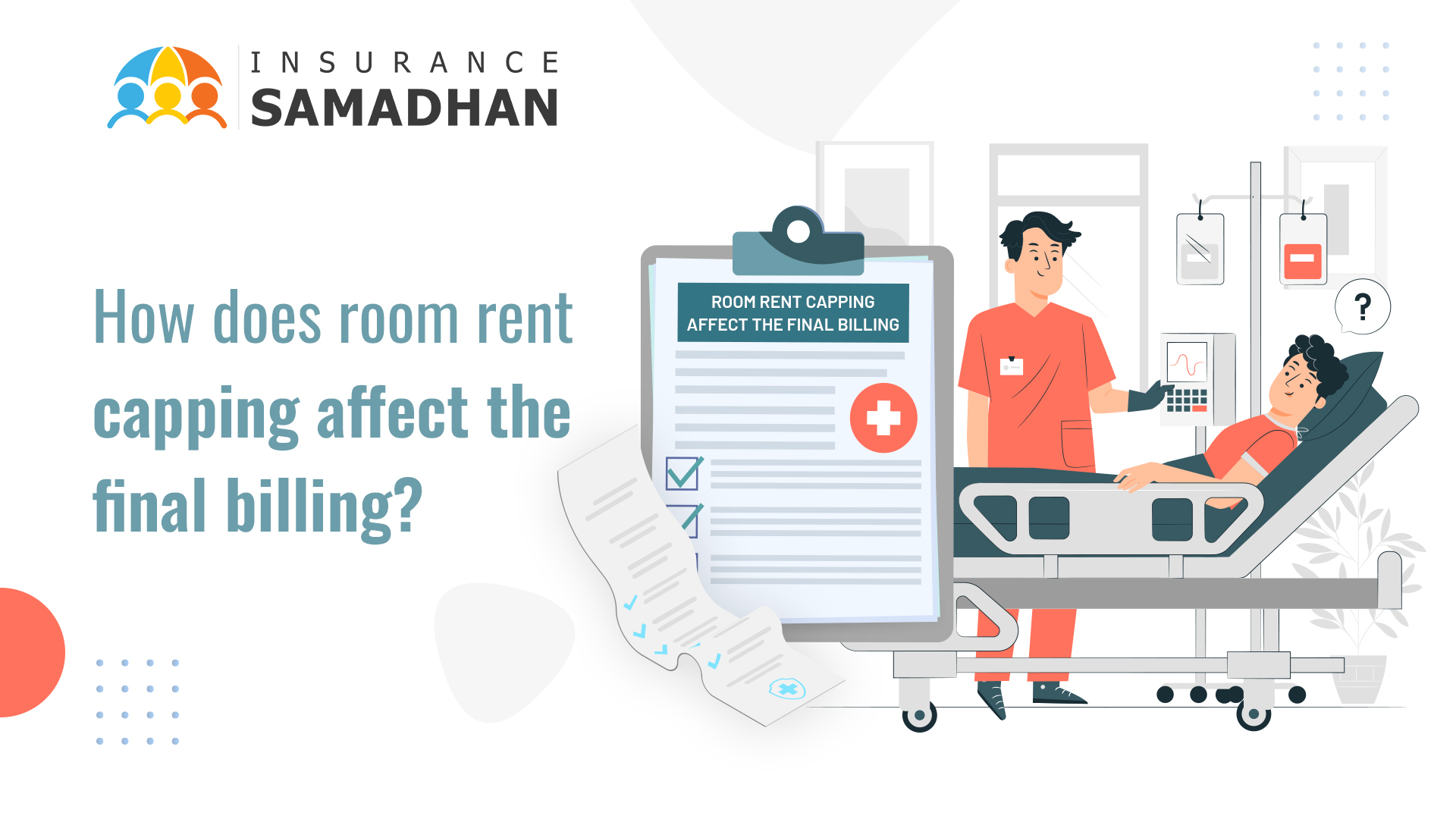Introduction
Have you ever been surprised by a hospital bill that was much higher than you expected, even after having health insurance? One common reason behind this could be something called “room rent capping” in your policy. At Insurance Samadhan, we often see policyholders caught off guard by this provision during the health insurance claim process. Room rent capping can significantly impact your final hospital bill so read on to learn what it is and how it affects your insurance claim settlement.

What is Room Rent Capping?
Room rent capping is a clause in health insurance policies that limits the amount your insurer will pay for your hospital room charges per day. This cap can be defined in two ways:
1. Absolute amount cap: For example, your policy might specify a maximum room rent coverage of ₹3,000 per day.
2. Percentage-based cap: Your policy might limit room rent to a certain percentage of your sum insured, such as 1% of the total sum insured per day.
So, if you have a policy with a sum insured of ₹5 lakhs and a 1% room rent cap, your maximum covered room rent would be ₹5,000 per day.
The Domino Effect: How Room Rent Capping Impacts Your Final Bill
What many policyholders don’t realise is that exceeding the room rent limit doesn’t just affect the room charges, it triggers a cascading effect on your entire hospital bill and the health insurance claim amount. Here’s how:
1. Proportionate Deduction on Associated Medical Expenses
When you opt for a room with rent higher than your cap, most insurers apply what’s called “proportionate deduction” to many other billing components. This means they reduce the health insurance claim amount for these expenses in the same proportion as your room rent excess.
Let’s understand this with an example:
Suppose your policy has a room rent cap of ₹3,000 per day, but you choose a room that costs ₹6,000 per day. The ratio of excess is 2:1 (you’re paying twice the covered amount).
Now, for many associated expenses like doctor’s fees, nursing charges, operation theater costs, and procedure charges, the insurer might pay only 50% (applying the same 2:1 ratio). This can drastically increase your out-of-pocket expenses.
2. Which Expenses Are Typically Affected?
The proportionate deduction usually applies to:
a) Doctor’s consultation fees
b) Surgeon’s fees
c) Operation theater charges
d) Nursing charges
e) Procedure charges
However, it generally doesn’t apply to:
a) Medicines
b) Consumables
c) Diagnostic tests
d) Package rates for specific procedures
3. The Substantial Impact on Final Bill
The effect of room rent capping on your final bill can be quite significant. Let’s look at a typical scenario:
Hospital Bill Breakdown for a 5-day stay:
a) Room charges: ₹30,000 (₹6,000 × 5 days)
b) Doctor’s fees: ₹25,000
c) Operation theater and surgeon’s fees: ₹50,000
d) Nursing and other charges: ₹15,000
e) Medicines and consumables: ₹30,000
f) Diagnostics: ₹20,000
Total bill: ₹1,70,000
With a room rent cap of ₹3,000 per day (1:2 ratio):
a) Room charges covered: ₹15,000 (instead of ₹30,000)
b) Doctor’s fees covered: ₹12,500 (instead of ₹25,000)
c) Operation theater and surgeon’s fees covered: ₹25,000 (instead of ₹50,000)
d) Nursing and other charges covered: ₹7,500 (instead of ₹15,000)
e) Medicines and consumables covered: ₹30,000 (no proportionate deduction)
f) Diagnostics covered: ₹20,000 (no proportionate deduction)
Total covered: ₹1,10,000
Your out-of-pocket expense: ₹60,000
As you can see, exceeding the room rent cap by choosing a ₹6,000 per day room instead of one within the ₹3,000 limit resulted in an additional expense of ₹60,000!
What Can You Do About Room Rent Capping?
At Insurance Samadhan, we recommend these strategies to deal with room rent capping:
Before Hospitalisation:
1. Know your limits: Carefully review your policy to understand the room rent cap before planning hospitalisation.
2. Choose hospitals and rooms wisely: Select a hospital room that falls within your policy’s room rent limit.
3. Check for room rent waiver: Some premium health insurance plans offer a room rent waiver feature. Consider upgrading to such a policy during renewal.
4. Opt for higher sum insured: If you prefer better hospital rooms, choose a policy with a higher sum insured (if the cap is percentage-based) or higher room rent limit.
If You’ve Already Faced Deductions:
If you’ve already faced significant deductions in your health insurance claim due to room rent capping and believe there are discrepancies in how the proportionate deduction was applied, you might have grounds for appeal. Some hospitals charge premium rates for everything when you choose a higher category room, which may not be reasonable or customary.
In such cases, Insurance Samadhan can help you by:
1. Analysing your policy and the claim settlement to identify unfair deductions
2. Helping you organise documentation to support your case
3. Drafting compelling appeal letters that address specific concerns about proportionate deductions
4. Guiding you through the appeals process
Is Room Rent Capping Always Applied?
It’s worth noting that some specific scenarios might be exempt from room rent capping:
1. ICU charges: Most policies don’t apply room rent caps to ICU charges.
2. Emergency hospitalisations: Some policies waive room rent restrictions for emergency admissions.
3. Specific critical illnesses: Certain policies may waive room rent caps for serious conditions like cancer or heart attacks.
Final Thoughts
Room rent capping is one of those policy clauses that seems minor but can have a major impact on your hospital bill. Understanding how it works is crucial for making informed decisions about your healthcare and insurance choices.
At Insurance Samadhan, we’ve seen numerous cases where policyholders were shocked by massive deductions due to room rent capping. Whether you need help understanding your current policy’s provisions or insurance claim assistance for an existing claim that has been reduced due to proportionate deductions, remember that you don’t have to navigate these complex insurance matters alone.
Click here to register your complaint with Insurance Samadhan
Visit our website: insurancesamadhan.com
Mail us at corporate@insurancesamadhan.com
